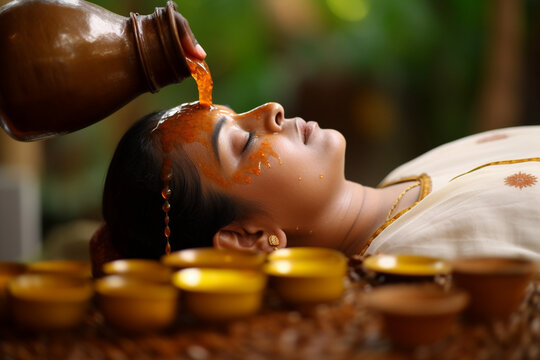In today’s fast-paced world, many of us are dealing with stress, imbalances, and toxins that accumulate in our bodies due to lifestyle choices, environmental pollutants, and processed foods. Ayurveda, one of the world’s oldest holistic healing systems, offers a natural and profound way to cleanse the body and restore balance—Panchakarma Therapy.
So, what exactly is Panchakarma? In simple terms, it’s a five-step Ayurvedic detox that aims to eliminate toxins, balance your doshas (energetic forces in your body), and promote physical and mental well-being. Let’s break down this ancient therapy and explore its potential benefits.
What is Panchakarma?
Panchakarma, derived from the Sanskrit words “Pancha” (five) and “Karma” (actions), refers to a set of five therapies designed to detoxify the body, improve digestion, and rejuvenate the overall system. This Ayurvedic detox helps to expel toxins known as “ama” from your body and restore the balance of Vata, Pitta, and Kapha doshas.
The process involves personalized treatments based on your body type, specific health conditions, and the imbalances you’re dealing with. It is a highly individualized therapy that takes into account your mental, emotional, and physical state to tailor the best detox plan.
The Five Stages of Panchakarma
Each stage of Panchakarma therapy serves a distinct purpose in detoxifying and rejuvenating the body. Here’s a breakdown of the five therapies:
- Vamana (Therapeutic Vomiting)
The process of Vamana involves inducing vomiting to eliminate toxins from the upper respiratory and gastrointestinal tract. It is particularly effective in balancing the Kapha dosha and relieving issues like chronic colds, allergies, or asthma. - Virechana (Purgation Therapy)
Virechana focuses on the digestive system. Through the use of herbal laxatives, it flushes out toxins from the small intestine, liver, and gallbladder. This therapy is recommended for those dealing with conditions related to excess Pitta, such as skin problems or liver disorders. - Basti (Medicated Enemas)
Considered one of the most important treatments in Panchakarma, Basti uses herbal enemas to cleanse the colon and balance the Vata dosha. It not only detoxifies but also nourishes the body, helping with conditions like arthritis, constipation, and digestive issues. - Nasya (Nasal Cleansing)
Nasya involves administering herbal oils or powders through the nostrils to clear the head and neck region. It’s particularly effective for sinus issues, migraines, and neck pain. Nasya also helps sharpen the senses and improve mental clarity. - Raktamokshana (Bloodletting)
Though not always a part of every Panchakarma treatment, Raktamokshana is used to cleanse the blood and is particularly useful for treating skin conditions, gout, and other blood-related disorders.
The Benefits of Panchakarma Therapy
The benefits of Panchakarma are profound and holistic. Regularly undergoing this Ayurvedic detox can lead to significant improvements in both physical and mental health. Some of the major benefits include:
- Deep Detoxification: Panchakarma cleanses the body of ama (toxins) that accumulate from improper digestion, stress, and pollution. This detox helps you feel lighter, more energetic, and clearer-minded.
- Balance of Doshas: Panchakarma helps to restore the natural balance of Vata, Pitta, and Kapha doshas, which is essential for maintaining health and preventing disease.
- Improved Digestion and Metabolism: By resetting the digestive system, Panchakarma enhances your body’s ability to absorb nutrients and process food more efficiently.
- Mental Clarity and Emotional Balance: Beyond just physical detox, Panchakarma has a calming effect on the mind, helping reduce anxiety, improve sleep, and promote emotional well-being.
- Boosted Immunity: Regular Panchakarma treatments strengthen the immune system, making it easier for your body to fend off illnesses.
Who Should Consider Panchakarma?
Panchakarma therapy can be beneficial for anyone looking to improve their overall health, but it’s especially helpful for those dealing with chronic conditions like stress, digestive issues, and imbalances in the body. People with lifestyle-induced ailments such as myopia may also find Ayurvedic treatments, such as the ayurvedic treatment for myopia, highly beneficial.
It’s important to consult with a certified Ayurvedic practitioner who can guide you through the Panchakarma process, ensuring it’s customized to your individual health needs.
Integrating Panchakarma with Other Ayurvedic Treatments
Panchakarma can be an excellent complement to other Ayurvedic treatments. For example, if you are dealing with liver issues, combining Panchakarma with a liver cirrhosis treatment in Ayurveda can offer a more comprehensive approach to healing. Ayurvedic therapies work synergistically to cleanse, heal, and rejuvenate the body on multiple levels.
What to Expect During Panchakarma Treatment
Panchakarma is not a quick-fix solution; it requires commitment, time, and the right guidance. Typically, the treatment process can take anywhere from a few days to a few weeks, depending on the severity of your condition and the level of detox your body needs.
The treatment begins with Purvakarma, which is the preparatory stage. It involves activities like oil massages and steam therapies to loosen toxins and bring them into the digestive tract. Then, the main Panchakarma treatments (like Vamana and Virechana) are performed. Lastly, the Paschatkarma phase involves lifestyle modifications, including diet and meditation practices, to ensure the body remains in balance post-detox.
Conclusion
Panchakarma therapy offers a comprehensive, time-tested approach to detoxification and rejuvenation. By balancing your doshas and removing toxins, this ancient Ayurvedic therapy can help you achieve optimal health and well-being. Whether you’re looking to enhance your digestive health, boost your immune system, or simply feel more energetic and balanced, Panchakarma could be the natural solution you need.
Before starting any Panchakarma program, it’s always wise to consult with a knowledgeable Ayurvedic practitioner who can assess your specific needs and guide you through the process. With the right support, Panchakarma can transform your health, helping you feel revitalized from the inside out.

